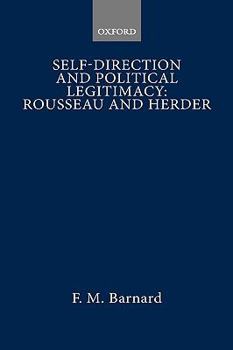Self-Direction and Political Legitimacy: Rousseau and Herder
Johann Gottfried Herder (1744-1803) has been called the German Rousseau. Yet while Rousseau is recognized as a political thinker, Herder is not. This book explores each thinker's ideas--on nature and culture, selfhood and mutuality, paternalism, freedom, and autonomy--and compares their conceptions of legitimate statehood. Arguing that the crux of political legitimacy for both men was the possibility of "extended selfhood," Barnard shows that Herder,...
Format:Hardcover
Language:English
ISBN:0198273274
ISBN13:9780198273271
Release Date:February 1989
Publisher:Oxford University Press, USA
Length:344 Pages
Weight:1.41 lbs.
Dimensions:1.0" x 5.7" x 8.8"
Customer Reviews
0 rating





